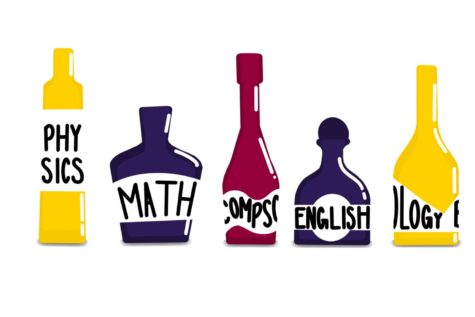OPINION | Stop normalizing alcoholic tendencies
March 16, 2022

Drinking alcohol in college is anything but taboo; in fact, many may see drinking as an integral part of the college experience. While this sentiment may hold true at universities across the country, it is particularly true at Tulane University.
Tulane is situated within a cluster of neighborhood bars that cater to college students, one of which is only steps away from Tulane’s iron gates. Many of these bars feature daily drink specials that lower already reasonable drink prices down to bargains that could seem irresistible to budgeting college students.
The Boot Store, part of The Boot Bar and Grill’s franchise, offers e-cigarettes, liquor, beer, “grab-n-go booze,” wine, champagne, energy drinks, non-alcoholic beverages and snacks, according to their website. It is not uncommon to walk on or around Broadway Street and find Tulane students enjoying a drink outside on a Tuesday afternoon or even doing homework while indulging in a mimosa pitcher.
All this is to say that alcohol is only minutes away from any point on Tulane’s campus and is available at most times throughout the day.
If drinking at nearby college bars does not seem attractive to students, there are dozens of highly rated bars in the neighboring Uptown area, dozens more in New Orleans’s infamous French Quarter and a handful of liquor stores around campus.
The close proximity of alcohol to campus that normalizes frequent or even daily drinking is only part of the problem.
Drinking is a part of New Orleans culture, and thus, drinking is a part of Tulane. Unlike students at other universities in the U.S., Tulane students abide by New Orleans’s open-container laws. They observe Mardi Gras break, a time in which the city enters intense celebration filled with booze, parades, beads and all-nighters. The only learning that occurs at Tulane during this time is learning how to party.
There are ubiquitous opportunities to drink as a Tulane student, but the notorious “work hard play hard” attitude and Tulane’s ranking as one of the top-rated party schools in the U.S. may make it seem like one has to drink to be a typical Tulane student.
Tulane is not blind to the fact that party culture is inextricable from our campus culture. On Tulane’s admissions blog, former Director of Admission, Jeff Schiffman once wrote, “at Tulane, you do not have to ‘party’ to love your four years in New Orleans. There is so much else to do aside from drinking at a fraternity party or tailgating for a football game.”
This statement is not incorrect by any means. Both Tulane and New Orleans are too well-known for their drinking culture, which sometimes seems to overshadow everything else the school and the city have to offer.
But, if college students often drink to relieve pressure in social situations or to escape from other anxieties, they may feel like drinking is a part of fitting in at Tulane, especially when it feels like there are limited opportunities to socialize in a sober setting.
Nationwide, college students fall victim to the mindset that “It’s not alcoholism until you graduate.” In other words, it is normal to binge drink, drink frequently — daily, even — and black out, just because we are in college, and it seems like everyone else does it too.
While college is a time primarily for academic enrichment, it is just as importantly a time when young adults can, and should, try new things, set boundaries for themselves and create lifelong habits.
Alcoholism, or anything that resembles it, should not be one of these habits.
Environments where life-threatening drinking habits are common makes it more challenging for students who begin to suffer from substance abuse issues to realize potentially dangerous habits and seek help. Not everyone who engages in heavy drinking is an alcoholic, but it is trickier to differentiate problematic habits from alcoholism within the culture of heavy drinking.
Students who may have already addressed substance abuse problems could find themselves pulled back by the excessive drinking of their peers at Tulane.
At Tulane, Thursday Pitcher Night at the Boot may be more familiar to students than the resources available for substance abuse.
Neither Tulane as an institution nor its administration is to blame for the drinking culture on campus. The student body is not necessarily to blame, either — excessive alcohol use is a public health issue across the country.
The drinking aspect of our university is unlikely to go away, and it should not. Drinking is often normal, fun and safe.
Having a drink regularly is not alcoholism and by virtue of being a Tulane student, you are not an alcoholic. However, if you feel like you are at risk for alcoholism, this campus may not be the easiest place for you to be.
To counteract sentiments like “work hard play hard” and “it’s not alcoholism until you graduate,” we must be conscious as a student body and as a community to be able to identify when it is alcoholism, and when we might be playing a little too hard. Unfortunately, one may not know until it is too late.
Tulane and New Orleans’ famed drinking and party culture is certainly celebrated by students. However, this ability to celebrate should not erase the associated issues. We must also elevate organizations and resources that can help any peer that may be quietly suffering.






















Alex • Apr 25, 2022 at 1:46 pm
It wasn’t until I left Tulane and started working full time that I realized the level of drinking throughout a normal day at Tulane is not normal anywhere outside of Tulane. It created a culture of high functioning alcoholics.
Ron • Mar 17, 2022 at 8:17 am
Very good discussion of a legitimate issue, alcoholism – which in turn spawns a host of adjacent problems for individuals and society at large. #moderation